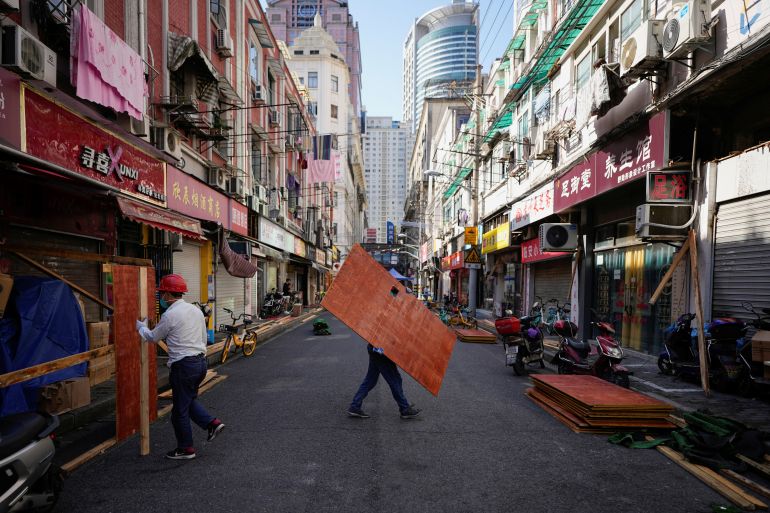Shanghai starts dismantling fences ahead of COVID lockdown end
Shanghai’s residents will have to take regular COVID-19 tests and follow strict rules even when lockdown is lifted.

Shanghai authorities have begun dismantling fences around housing compounds and ripping police tape off public squares and buildings, as the city prepares to lift a two-month-long lockdown at midnight (16:00 GMT).
The ruthlessly-enforced restrictions have caused despair among the city’s 25 million people and left many struggling to get food or find emergency healthcare.
Keep reading
list of 4 itemsChina’s Shanghai says ‘normal life’ will resume on June 1
Mass testing and lockdowns: Inside China’s ‘zero COVID’ policy
China’s COVID hard line eats into everything from Teslas to tacos
They have also fuelled public anger and rare protests inside Shanghai and battered the city’s manufacturing and export-heavy economy, disrupting supply chains in China and around the world.
Life is set to return to something more like normal starting Wednesday, when the passes required for people to go out for a few hours will be scrapped, public transport will resume, and residents will be encouraged to return to work.
“Now that I’m going back to work so suddenly, I feel a little nervous,” said resident Joseph Mak, who works in education. “It’s hard to believe it’s actually happening.”
The easing of curbs applies only to those in low-risk areas, or about 22.5 million people. Residents will still have to wear masks and are discouraged from meeting in groups.
Dining inside restaurants will also remain banned, while shops will be allowed to operate at 75 percent capacity.
Residents will have to get tests for COVID-19 every 72 hours to take public transport and enter public venues and those who test positive, as well as their close contacts, will still have to endure a strict quarantine.
China is alone among major countries enforcing an uncompromising “zero COVID” policy that aims to stamp out all outbreaks as soon as they occur no matter the cost.
The highly-transmissible Omicron variant is prone to making comebacks and it remains to be seen if frequent testing can keep it under control.
Different life
Todd Pearson, managing director of Camel Hospitality Group, which operates eight restaurants, four bars and three gyms in Shanghai and neighbouring Suzhou, is wary.
His restaurants are only allowed to do deliveries, which amount to about 5 percent of revenue, not enough to pay salaries and rent. At least from midnight his workers, who have been sleeping in the restaurants as they were stuck there due to the strict lockdown rules, can finally go home.
“I’m hopeful that they will rush things along quickly to restart the economy,” Pearson said. “I just hope it’s not at the cost of more outbreaks. I’m not sure many businesses or the people could handle much more.”
Shanghai reported 31 cases for May 30, down from 67 a day earlier, all within controlled areas. The downtrend in cases is in many other cities in China, with new daily infections falling to 174 from 184, nationally.
Other countries, which have decided to co-exist with the virus even as infections spread, are reporting thousands of new cases daily.
Once the Shanghai lockdown is lifted, life will still look very different in the city compared with those places.
Some banking clerks said they will be required to wear full hazmat suits and face shields as they start facing the public on Wednesday.
One banking worker, who only gave his surname as Qin, said he would take some basic supplies to work, in case a colleague tests positive and staff are required to isolate in the office.
“I need to pack some clothes and supplies to leave at the office. Just in case,” Qin said.
The lockdown has fuelled rare protests, with people at times banging pots and pans outside their windows to show their discontent with the strict measures, and many taking to social media to share frustrating interactions with authorities and other personal dramas caused by the restrictions.
The public anger comes during a sensitive year for President Xi Jinping, who is widely expected to secure a precedent-breaking third leadership term this autumn.